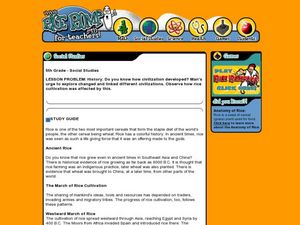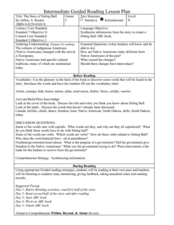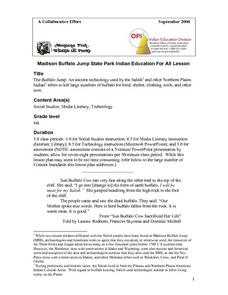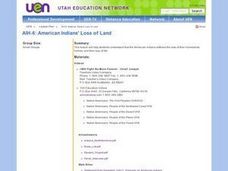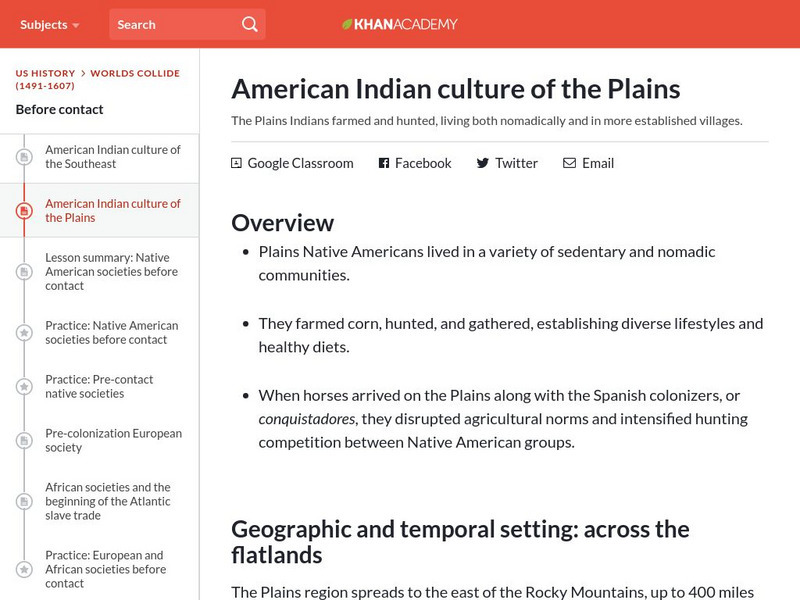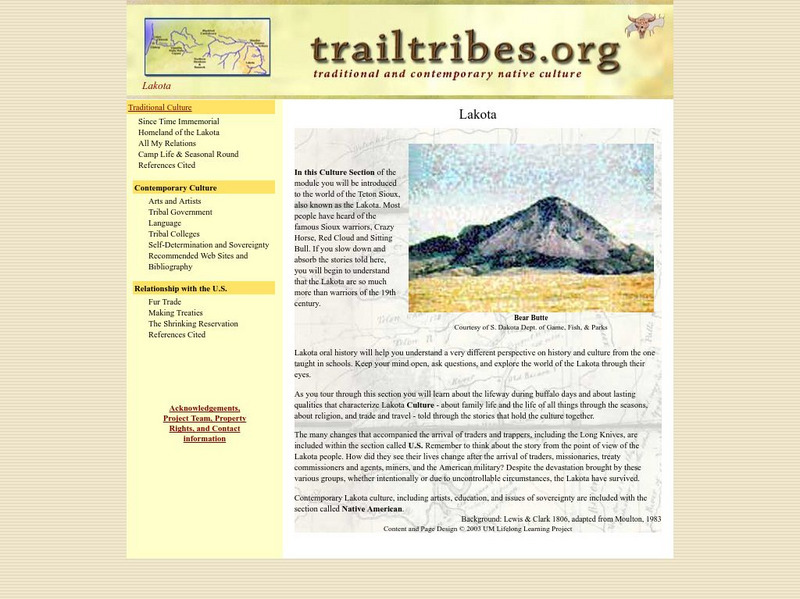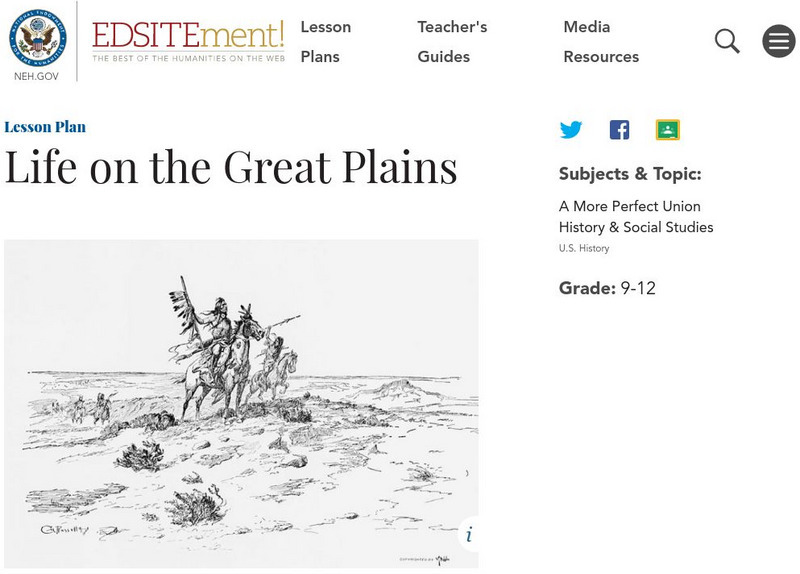Curated OER
Developing Civilizations and the Role of Rice
Student investigate how civilizations developed. In this rice farming lesson, 5th graders explore how rice cultivation changed through different civilizations. Students gain knowledge about different types of rice, where it's grown and...
Curated OER
The Story of Sitting Bull
Students complete activities with the book The Story of Sitting Bull by Jeffrey A. Rucker. In this literature lesson, students review new vocabulary and practice finding capital letters. They read the story, answer...
Curated OER
The Buffalo Jump
Eighth graders investigate the disappearance of buffalo. They conduct research into the uses of buffalo by the Native Americans. There are resource links included in this lesson. They answer specific questions to help guide the research...
Curated OER
Native American Trivia Book
Fourth graders research information about the Eastern Woodland Indians for a class trivia book. They Save, proofread, and print out their trivia sheet and design a cover page for the book.
Curated OER
Idaho
In this Idaho reading comprehension worksheet, students read a 2-page selection regarding the state and they answer 10 true or false questions pertaining to the selection.
Curated OER
Cultural Vantage Points
Eighth graders investigate the history of Beaverhead County and Big Hole Valley. They focus on the Native American people groups of the immediate area. Students read about the journey of Lewis and Clark to create historical context. Then...
Curated OER
American Indians' Loss of Gold
Fifth graders examine and discuss how the American Indians suffered the loss of their homelands, homes, and their way of life. They watch videos, read books and develop research projects on the struggles of the American Indians.
Curated OER
Whose Rock Is This Anyway?
Young scholars will seek to understand the events at Pipestone Quarry and what may have caused them. Pipestone Quarry in Pipestone, Minnesota, bears the mythic red Sioux quartzite called Pipestone or Catlinite.
Curated OER
Kansas
In this Kansas reading comprehension worksheet, students read a 2-page selection regarding the state and they answer 10 true or false questions pertaining to the selection.
Glenbow Museum
Glenbow Museum: Pictograph Robes of the Plains Indians
Plains Indians often recorded their history in pictograph form on their tipis and buffalo skins. View the original artwork by He Dog (Percy Creighton)as he interpreted the history of the Blood Indians.
Khan Academy
Khan Academy: American Indian Culture of the Plains
The Plains Indians had a dynamic society that changed over time. See how the introduction of the horse changed their way of life. Read about their religion, societal structure, housing, and tools. Included are pictures, maps, critical...
Other
An Introduction to North America's Native People: Plains Culture Area
A wonderful website from Cabrillo College on the Plains Indians can be found here. It gives an in-depth historical overview, profiles of numerous Plains tribes, the significance of the horse, and great information on their culture and...
Other
All About Shoes: Paths Across the Plains: Traditional Footwear From Great Plains
Lesson plans for two different grade levels discussing the footwear of the Plains Indians and the information one can gather from common items to find out about a culture.
Alabama Learning Exchange
Alex: Just Plain Living
Students work through a teacher-prepared WebQuest in order to learn about the art, food, shelter, clothing, etc. of the Plains Indians. Internet resources are used to collect information in order to make group presentations to the class....
Other
Trail tribes.org: Lakota
An excellent resource on the Lakota tribe. It covers the Lakota's' modern and historical culture, as well as the tribe's relationship with the United States during the days of European settlers. This site provides valuable information...
Nebraska Studies
Nebraska Studies: Tribes in Nebraska Give Up Lands in Treaties
Review this discourse of the many treaties enacted between the settlers and Native Americans during the development of the Great Plains, the problems that arose, and the creation of reservations.
Government of Alberta
Unesco: Head Smashed in Buffalo Jump Interpretive Centre
This virtual interpretive centre recreates the buffalo hunt and kill that was used by First Nations Plains tribes for over 5,500 years. Located in southern Alberta, the actual site was designated as a UNESCO World Heritage Site in 1981.
Smithsonian Institution
National Museum of American History: What Can You Make From a Buffalo?
The northern Plains Indians used every part of the buffalo. In this interactive matching game, students will match objects made by Native Americans from the buffalo.
National Endowment for the Humanities
Neh: Edsit Ement: Life on the Great Plains
A detailed lesson plan that explores "the concept of region and how culture and experience influence the perception of regions." Site provides many excellent websites for students and teachers to explore during their study of the Great...
Other
Trans Mississippi and International Exposition: The Arapaho Tribe
Provides general information on the Arapaho tribe, the buffalo hunters of the Great Plains.
Other
Ethnological Museum: Native Americans of the Plains
Part of a larger exhibition about Native Americans, this page gives visitors an up-close look at the Hidatsa and the Mandan, Native Americans of the Plains. Viewable are a decorated a buffalo skin and color etchings of tribal chiefs...
Smithsonian Institution
National Museum of the American Indian: Song for the Horse Nation
An exhibition about horses in Native American cultures takes a sweeping look at the ways in which Native peoples, past and present, regard horses and horsemanship. Learn how the horse transformed Native approaches to the hunt, warfare,...
Northwestern University
American Memory: Edward S. Curtis's North American Indian: Photographic Images
Find Native American tribes grouped by geographic location as well as relevant information and pictures.
National Endowment for the Humanities
Neh: Edsit Ement: Anishinabe Ojibwe Chippewa: Culture
Though written for grades 3-5, this lesson plan can be easily changed to help learners of all ages learn about the Chippewa people. Additional resources provide historical, cultural, and geographical facts concerning this Native American...


